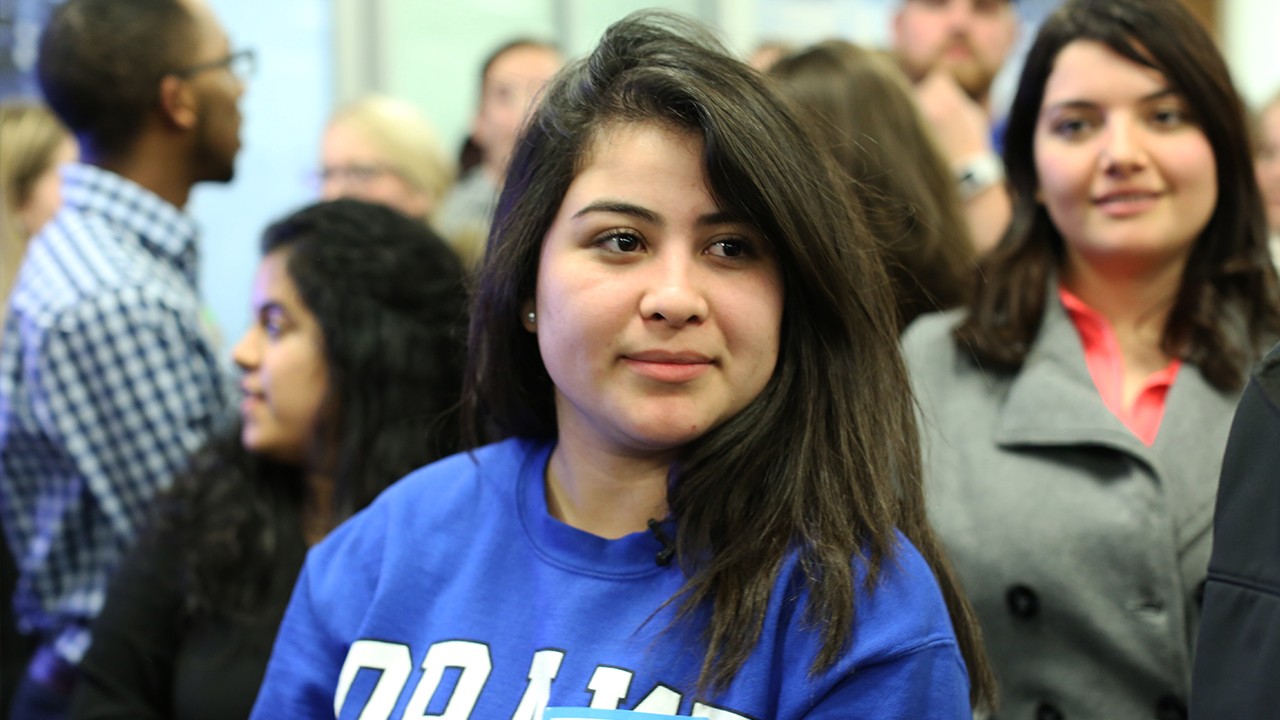Image via Facebook.
Right now, politicians residing at unreachable levels are making decisions about how we treat existing and potential immigrants here in America. The perpetual uncertainty and movement towards potentially horrific outcomes are causing many to feel helpless and powerless over their own future, almost as though there is nothing they can do but wait for the other shoe to drop.But the situation is fluid and there’s good reason to be optimistic. The next wave of changemakers are closer to having an impact on the future of their own families—and countless others—than you might think.Define American, a nonprofit organization created by Pulitzer Prize-winning journalist Jose Antonio Vargas, was founded after the New York Times published an essay from Vargas announcing he was coming out as an undocumented immigrant. Subsequently, Define American released his film Documented, which detailed Vargas’ experience coming out as an undocumented immigrant living in America. A subsequent documentary, called White People, aired on MTV in 2015, in which he travels around the country engaging college-ahed young people around the ideas of whiteness and white privilege.The program is currently on 50 college campuses across 26 states and Washington D.C.
Check out more videos from VICE:
Essentially, it’s akin to having a built-in grassroots organizing network. In addition to the students creating welcoming spaces on their campuses, they’re challenging local media to use more humanizing language and ask harder questions reporting on immigration.At the recent Define American College Chapters Summit, the first national convening of Define American’s college chapters, program participants discussed how their respective campuses could do more to support undocumented students, including creating scholarships, allowing undocumented students to pay in-state tuition, and protecting students while on campus. Students felt that their school administrators, faculty, staff, and peers weren’t fully informed about what it means to be undocumented. The priority: to highlight their own personal stories of what it’s like to witness or experience immigrant justice in their campus communities.It is from these small group discussions at the Define American College Chapters Summit that the student activists developed a new program-wide chapters principle: “We believe in equity of education for everyone regardless of status.”The other existing principles are geared at helping immigrants access the same opportunities and engage in their own communities the same way any other American does. Other core principles include using storytelling to create meaningful change and ensuring accessible education regardless of status—that means equal access to scholarships and campus resource, which isn’t always the case.Storytelling also comes in the form of creating pieces of media like film, using video to tell their stories on Define American’s online story platform or to a local or campus reporter.Others chapters have thrown support behind #WordsMatter, a campaign that seeks to help national media stop using dehumanizing phrases such as “illegal immigrant” and “illegal alien,” getting their school newspapers to take the #WordsMatter pledge in an effort to continue to humanize the language used about new Americans.
Advertisement
What makes Define American unique is its focus on reaching the next generation of leaders in the educational system in both colleges and high schools across the country.After the film was was completed Vargas and MTV worked with the Anti-Defamation League to create a discussion guide for high school teachers to help them facilitate conversations around the film in their own classrooms. The curriculum is aligned with both the Common Core 11th and 12th grade English Language Arts and Social Studies standards.Then, in October 2015 came the Define American College Chapters program.“Our Chapters program is designed to give students a platform to have necessary and constructive conversations on immigrants, identity, and citizenship,” said Julián Gustavo Gómez, Campus Engagement Manager at Define American. “These topics are on everyone’s minds, but the stories and facts that connect the dots and humanize the issue of immigration are often absent from the discussion."The program is currently on 50 college campuses across 26 states and Washington D.C.
Advertisement
Check out more videos from VICE:

Essentially, it’s akin to having a built-in grassroots organizing network. In addition to the students creating welcoming spaces on their campuses, they’re challenging local media to use more humanizing language and ask harder questions reporting on immigration.At the recent Define American College Chapters Summit, the first national convening of Define American’s college chapters, program participants discussed how their respective campuses could do more to support undocumented students, including creating scholarships, allowing undocumented students to pay in-state tuition, and protecting students while on campus. Students felt that their school administrators, faculty, staff, and peers weren’t fully informed about what it means to be undocumented. The priority: to highlight their own personal stories of what it’s like to witness or experience immigrant justice in their campus communities.It is from these small group discussions at the Define American College Chapters Summit that the student activists developed a new program-wide chapters principle: “We believe in equity of education for everyone regardless of status.”The other existing principles are geared at helping immigrants access the same opportunities and engage in their own communities the same way any other American does. Other core principles include using storytelling to create meaningful change and ensuring accessible education regardless of status—that means equal access to scholarships and campus resource, which isn’t always the case.
Advertisement
Dawn Krenz, a U.S. History teacher at Watsonville High School, said that using Documented and the curriculum that came with it helped her classroom develop and discuss the concept of what it means to be an ally, and how to support and stand up for others. “It was a very empowering experience for them,” she told VICE Impact.Another teacher at the school, Chrissy MacLean, said that starting off the year talking about immigration and using the curriculum to tie it to U.S. history helped the kids feel like “we cared about their story and their families story,” and that she knew the topic was relevant to many of her students on a personal level.“We are thinking that the government is going to be targeting us if we say we are undocumented, but the truth is, we are here already, we are American,” former student Ramon Ortiz, Class of 2015, told VICE Impact. We could be the ones working in your garden, we could be your doctors.”“When we come into teaching, we are sort of taught to be colorblind or race blind and yet race matters. And so walking that fine line with students and being open and honest to that is a really important conversation to have with students,” said Sarah Roe, the school’s U.S. Government and Economics teacher.“We believe in equity of education for everyone regardless of status.”
Advertisement
Define American’s next big move is to host college sanctuary petitions on Change.org, the world's largest online civic-organizing platform, around the fact that the Deferred Action for Childhood Arrivals is being terminated, making Dreamers once again vulnerable including risk of deportation.“Define American’s college chapters using our platform as a space to influence people in power and to shape conversations around immigration and citizenship isn’t something we take for granted. Stories matter, and we appreciate the opportunity to help elevate those to the broader public.” said Change.org spokesman A.J. Walton.
Five participating college chapters have created petitions asking college presidents and universities to publicly express their commitment to the protection of all its students, especially those who are recipients of DACA and to keep tuition rates the same for students who are losing DACA.College chapter leaders in places like the University of Nebraska–Lincoln have created scholarships for undocumented students.“In several states, undocumented students are categorized as international students and cannot pay in-state tuition even if they’ve been living in that state most of their lives. In regards to tuition, being undocumented disqualifies you from many scholarships,” said Gustavo Gómez. “Many students have been categorized as international students and been placed in separate student orientations or dorms, which further alienates them from the rest of the student body simply because they are undocumented.”“We are thinking that the government is going to be targeting us if we say we are undocumented, but the truth is, we are here already, we are American.”
Advertisement
Facts Matter is more of a behind the scenes initiative to ensure that stories about immigration are properly fact-checked, which leads to a lack of “statistical perspective, and are spread in order to enflame fear in the public,” according to Kristian Ramos, the organization’s Communications Director“Our Words Matter and Facts Matter campaigns have positioned our organization to tackle a media landscape which has in some ways been infected with nationalist fervor which demonizes immigrants and people of color,” said Ramos. “We are faced with a unique opportunity to have these conversations, which will allow us to further humanize the cultural and media conversations about how our country defines American.”Correction: This article previously stated Define American was on 50 college campuses across 23 states, when, in fact, it is in 26 states and Washington D.C. We regret the error.
